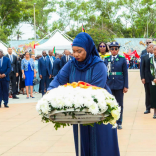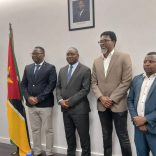Mia Couto calls for a more inclusive dialogue in Mozambique after general elections
Mozambique: Rebel actions persist in Cabo Delgado despite ‘stabilisation’ – PM

Photo: O País
Mozambican Prime Minister, Benvinda Levi, on Thursday acknowledged the “persistence of terrorist actions” as one of the country’s main challenges, but pointed to a “stabilisation” on the ground, which has allowed the “gradual return” of Cabo Delgado province residents to their areas of origin.
“One of the main challenges facing our country at the moment is the persistence of terrorist actions in some regions of Cabo Delgado, where they have been resorting, among other “modus operandi”, to sporadic attacks and dispersal into small groups,” acknowledged the Prime Minister, speaking in parliament to provide information to MPs.
In addition to committing heinous acts, terrorists have also recently resorted to systematic abductions and kidnappings along public roads, in mining areas and where other types of economic activities take place, in order to demand a cash ransom in exchange for the release of the victims taken hostage,” she added.
To address the situation, she added, “the Mozambican state has been implementing a set of security and socio-economic measures that are proving effective,” namely “the stabilisation of areas previously considered critical, including the establishment of security zones to protect population, production areas and public and private economic and social infrastructure.”
Also through “strengthening surveillance of the border region, in coordination with neighbouring countries, to prevent illegal migration, including that of people associated with terrorism” and by rebuilding basic infrastructure and strengthening humanitarian assistance “in coordination with humanitarian and development support organisations and reducing the exposure of vulnerable groups to violent extremism through the implementation of policies”.
“These and other results are enabling the gradual return of residents to their areas of origin and the resumption of basic social services and economic and productive activities,” Maria Benvinda Levi emphasised.
She stressed that “as a result of this set of measures and actions,” the security situation in Cabo Delgado “has been improving,” which contributed “to the recent lifting of the “force majeure” clause’ [ in the LNG megaproject led by TotalEnergies], which had been in force since 2021 and suspended the activities of the liquefied natural gas project in area 1 of the Revuma basin.”
“Recognising that despite these encouraging results in terms of security, we still face several challenges in preventing and combating terrorism. We therefore reaffirm the Government’s commitment and determination to continue to develop actions aimed at modernising and strengthening the operational capabilities of our defence and security forces,” she concluded.
The gas-rich province of Cabo Delgado in northern Mozambique has been the target of extremist attacks for eight years, with the first attack recorded on 5 October 2017 in the district of Mocímboa da Praia.
A survey by the Armed Conflict Location and Event Data Project (ACLED) estimates that the Mozambican province of Cabo Delgado recorded at least 12 violent events between 13 and 26 October, mainly involving extremists linked to Islamic State, causing 18 civilian deaths.
According to the latest ACLED report, of the 2,236 violent incidents recorded since October 2017, when the armed insurgency began in Cabo Delgado, a total of 2,061 involved extremists associated with Islamic State Mozambique (EIM).
These attacks have caused 6,659 deaths in just over eight years, according to the new report, including the 18 victims reported in less than two weeks in October.
The “dispersion of activity” across Cabo Delgado suggests that these groups operate in scattered units, allowing “insurgents to expand operations beyond traditional strongholds,” the report adds.












Leave a Reply
Be the First to Comment!
You must be logged in to post a comment.
You must be logged in to post a comment.